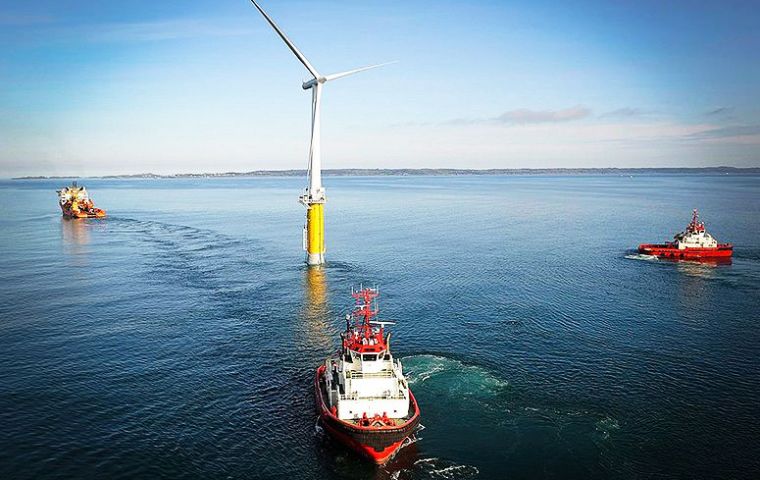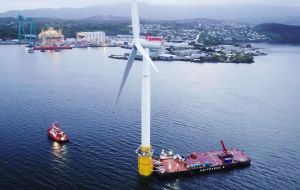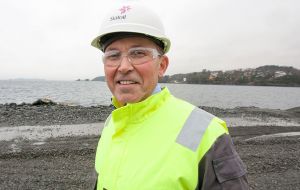MercoPress. South Atlantic News Agency
First full-scale floating wind farm begins to take shape off Scotland
 The operation to begin shifting the first of the 11,500 tons giants happened dramatically in the half-light of a Norwegian summer night.
The operation to begin shifting the first of the 11,500 tons giants happened dramatically in the half-light of a Norwegian summer night.  The giant is on the move, floating on a sealed vase-like tube 78 meters deep, its bottom filled with iron ore to weight the base and keep it upright in the water.
The giant is on the move, floating on a sealed vase-like tube 78 meters deep, its bottom filled with iron ore to weight the base and keep it upright in the water.  “I think eventually we will see floating wind farms compete without subsidy - but to do that we need to get building at scale,” said Mr. Delp, director of Hywind
“I think eventually we will see floating wind farms compete without subsidy - but to do that we need to get building at scale,” said Mr. Delp, director of Hywind The world's first full-scale floating wind farm has started to take shape off the north-east coast of Scotland. The revolutionary technology will allow wind power to be harvested in waters too deep for the current conventional bottom-standing turbines used.
The Peterhead wind farm, known as Hywind, is a trial which will bring power to 20,000 homes. Manufacturer Statoil says output from the turbines is expected to equal or surpass generation from current ones. It hopes to cash in on a boom in the technology, especially in Japan and the West coast of the US, where waters are deep.
“This is a tech development project to ensure it's working in open sea conditions. It's a game-changer for floating wind power and we are sure it will help bring costs down,” said Leif Delp, project director for Hywind. So far, one giant turbine has already been moved into place, while four more wait in readiness in a Norwegian fjord.
By the end of the month they'll all have been towed to 15 miles off Peterhead, Aberdeenshire, where they'll float upright like giant fishing floats.
While the turbines are currently very expensive to make, Statoil believes that in the future it will be able to dramatically reduce costs in the same way that manufacturers already have for conventional offshore turbines.
“I think eventually we will see floating wind farms compete without subsidy - but to do that we need to get building at scale,” said Mr Delp.
The operation to begin shifting the first of the 11,500 tons giants happened dramatically in the half-light of a Norwegian summer night. Crews secured thick cables to tug boats and used remote-controlled submarines to check for obstacles.
Finally the giant was on the move, floating on a sealed vase-like tube 78 metres deep, its bottom filled with iron ore to weight the base and keep it upright in the water.
The price of energy from bottom-standing offshore wind farms has plummeted 32% since 2012 - far faster that anyone predicted. The price is now four years ahead of the government's expected target, and another big price drop is expected, taking offshore wind to a much lower price than new nuclear power.
The Hywind project is being run in collaboration with the Abu Dhabi firm Masdar. The £190m cost was subsidized by bill-payers under the UK government's Renewable Obligation Certificates.
However the bird charity RSPB Scotland opposed the project - not because it dislikes the technology but because it believes too many offshore turbines in the area have already been approved and fears thousands of sea birds may be killed by the offshore wind farms, although it admits that estimates are hugely uncertain because it is impossible to count bird corpses at sea.




Top Comments
Disclaimer & comment rules-

Read all commentsThe question is why is this piece appearing in Mercopenguin, a British government propaganda organ supposedly devoted to America, South America and the “South Atlantic”?
Jul 31st, 2017 - 02:03 am 0Commenting for this story is now closed.
If you have a Facebook account, become a fan and comment on our Facebook Page!